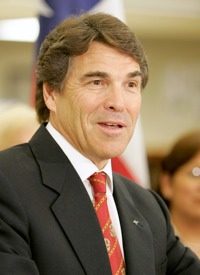
Perry’s connection with the Aga Khan Foundation dates back to 2002, when the Aga Khan Foundation and the University of Texas at Austin collaborated on a joint educational endeavor, the Muslim Histories and Cultures Program (MHC), in which 80 public school social studies teachers accepted training in how to sympathetically present Islamic history. "Aga Khan" is a hereditary title given to the Imam of one branch of the Shia faith. Perry’s close relationship with the Aga Khan, Prince Shah Karim Al-Husayni, has been well-documented. According to the Austin American-Statesman, Perry met Al-Husayni while vacationing with his family in Paris in 2000, and in 2002, Perry was invited by Al-Husayni to address numerous gatherings of Texas’ Nizari Ismaili community, a sect of Shiite Islam which reveres Al-Husayni as the physical and spiritual descendant of Muhammad, and is noted for its commitment to Islamic “social justice” causes and esotericism, according to historian Farhad Daftary. In 2005, Perry even laid the first brick at the groundbreaking ceremony for an Ismaili mosque in Plano. According to Kate Shellnut, a Houston Chronicle blogger, Perry has fairly wide support in the Texas Muslim community, a claim backed by Mustafaa Carroll, the executive director of the radical Islamist Council on American Islamic Relations (CAIR).
Numerous formal agreements were drafted between the Aga Khan Foundation and the state of Texas during Perry’s administration. On October 30, 2009, Perry and the Aga Khan “signed a historic agreement to expand collaboration in the areas of education, health sciences, natural disaster preparedness and recovery, culture and the environment,” according to the Aga Khan Development Network. At the ceremony, Perry hailed the Ismaili leader as a crucial partner in advancing civil society, and lamented that “traditional Western education speaks little of the influence of Muslim scientists, scholars, throughout history, and for that matter the cultural treasures that stand today in testament to their wisdom.”
Perry ensured that the Aga Khan Foundation received unhindered access to Texas school districts, effectively providing it with an ideal platform for advancing beliefs identified by historians as revisionist and unduly apologetic towards Islam. The curriculum that Perry introduced into the Texas public schools copiously quotes from Edward Said (the father of “Orientalism,” the belief that Western Christians relate to the Arab world with “Eurocentric bias” and are engaged in a de-legitimizing kulturkampf against the Islamic world, a belief rooted in methodologies adopted from Antonio Gramsci, the father of Eurocommunism). Said ascribed all critical discussion of Islamic jihad and Islamic supremacy to racism and neo-colonialism, warning that one should speak of “Islams rather than Islam,” and declaring that in dealing with Islam “one has entered an astoundingly complicated world.” This invocation of Islam’s complexity is frequently used to discourage those who point to the Qur’an’s violent passages and Muhammad’s exhortations to warfare as evidence of Islam’s bellicose intentions. Yet Islamic jihadists routinely refer to this material with no hesitation based on Islam’s “complexity.”
The curriculum also contains numerous inaccuracies intended to sanitize perceptions of Islam. For instance, it heavily borrows from Carl Ernst’s writings, as well as those of John Esposito, two non-Islamic scholars who reject the ideological and theological underpinnings of contemporary jihad. In addition, Ernst’s Following Muhammad (one of the curriculum’s source texts) unapologetically states that Muhammad “was, by all accounts, a charismatic person known for his integrity.” Muhammad’s exhortations to make war against unbelievers, his multiple marriages and child marriage, and other negative aspects of his biography are explained away or ignored entirely. The curriculum also ignores Islam’s history of violence against Christian Europe, and instead claims that “missionaries” promoted a biased view of Islam as a tool of “imperialist oppression.” This is hardly a curriculum any cultural conservative, concerned with the defense of Judeo-Christian civilization, would endorse, let alone fund with taxpayer dollars.
Perry’s relationship with Al-Husayni is troubling, considering Al-Husayni’s statements on terrorism and the United States. In an interview with Der Spiegel, the Imam accused Pope Benedict XVI of unnecessarily antagonizing the global Muslim community and chided the pontiff for “causing great unhappiness in the Muslim world.” In the same interview, he later stated that he believes that there is no ideologically or theologically motivated reason for terrorism; when asked what he believes the root causes of terrorism are, Perry’s friend answered, “unsolved political conflicts, frustration and, above all, ignorance. Nothing that was born out of a theological conflict.” He also denied that Islam has historically proselytized through violent means, and accused Christianity of being a “violent religion,” while legitimizing the terrorist group Hamas and urging diplomatic cooperation with its leaders. Perry, of course, has never distanced himself from these views, and instead, has used taxpayer dollars to allow the Aga Khan to spread his Islamist worldview through the public schools.
In addition, Perry has deep ties with Grover Norquist, according to Robert Spencer (director of the watchdog group Jihad Watch). Norquist, a member of the internationalist Council on Foreign Relations, which works behind the scenes with other groups to diminish the sovereignty of the United States and other countries in favor of a one-world government, (Perry is a member of the equally secretive Bilderberg Group), has been linked with efforts to try to alter GOP policies by making them more palatable to American Muslims. As David Horowitz pointed out several years ago, Norquist has worked with “prominent Islamic radicals who have ties to the Saudis and to Libya and to Palestine Islamic Jihad, and who are now under indictment by U.S. authorities.” Among them was Abdurahman Alamoudi, who was once the most prominent and powerful “moderate Muslim” in Washington, and is now in prison for helping to finance an al-Qaeda plot to assassinate the Saudi king, whom jihadis consider to be inexcusably lax in his Islamic observance (primarily in allowing infidel American troops onto the sacred soil of Saudi Arabia during the first Gulf War). Alamoudi gave Norquist’s Islamic Institute, in a gambit to try to garner Muslim votes for the Republican party, a $10,000 loan and a $10,000 gift.
Perry and Norquist held a joint press conference in March urging Texas legislators to not tap into the state’s “rainy day fund,” and Perry has appeared at numerous fundraisers for Norquist’s “Americans for Tax Reform” group. Norquist also actively campaigned for Perry in 2009, and in 2004, Perry was investigated by the Texas Ethics Commission for allegations that he illegally used campaign money to finance a trip to the Bahamas, which Norquist accompanied him on, at Perry’s full expense. Perry has never once chided his long-standing acquaintance for his Islamist connections, nor has he ever distanced himself from Norquist, once knowledge of his unsavory ties surfaced.
Perry’s ties with Aga Khan and other Islamist outfits in the United States raise serious questions as to whether he is a true friend of Israel and whether he really cares about America’s Judeo-Christian heritage. Like many politicians, Perry has used religion as a selling point in his campaign; he claims that he is committed to restoring America’s Christian heritage, and even hosted a statewide Christian prayer rally in August. In addition, Perry organized a press conference in New York City with Jewish leaders and newly elected Rep. Bob Turner (R-N.Y.) on September 20, condemning Obama’s Middle East policy and posture toward Israel, attempting to curry favor with Jews and Christians alike, while in actuality, his Islamist ties and lax immigration policy as Governor lend themselves to Balkanization and religious strife in America.
This article has been edited to eliminate the assertion that Mustafaa Carroll and the Council on American Islamic Relations (CAIR) "praised" Governor Perry "for his close relationship with the Muslim community in Texas." The change was made in response to a reader's comment by Carroll and subsequent fact-checking.
Photo of Rick Perry: AP Images



